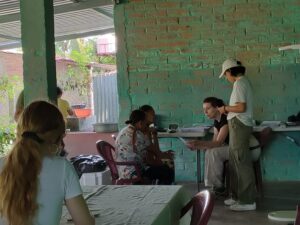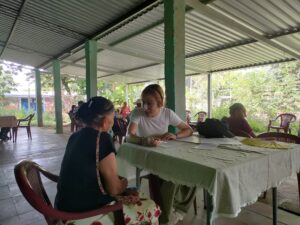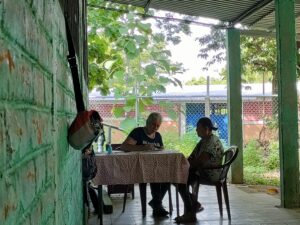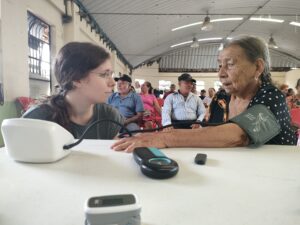
A cooperation project to improve the global health of vulnerable populations in Bajo Lempa, El Salvador.
Roberto Pedrero Tomé has been the main researcher of this Sustainable Development Cooperation Project promoted by the Complutense University of Madrid.
Ask. How would you summarize this project in a few lines?
Roberto Pedrero. It is difficult to summarize in a few lines the extensive work we have done. Our work group has been working since 2018 in the field of food security and growth in the school population in the Salvadoran region of Bajo Lempa. Fortunately, this year we have been able to expand the work team and thus be able to collaborate with organizations that fight for the human rights of older adults. In this way, we have been able to expand our range of action. Specifically, we have carried out approximately 300 anthropometric assessments on schoolchildren aged 5-16 in six schools in the region and we have provided school gardens to each collaborating center. In parallel, we have also carried out a series of anthropometric, food security, dietary and cognitive diversity assessments in a population of almost 300 older adults over 65 years of age, who attend institutionalized Day Homes in the region of Tecoluca, El Salvador. . .
P. Which institutions or organizations have participated in this project?
r. Numerous institutions have participated in this Cooperation Project. Our objective has been to draw on different specialists and thus be able to assemble a multidisciplinary, diverse and transversal team. As we have previously commented, the Complutense University of Madrid has financed this project through the XIX Call for Aid for Cooperation Projects that contribute to the achievement of the Sustainable Development Goals. This institution has been represented by the EPINUT Research Group, of which it is a part. They have also actively participated Spanish Society of Dietetics and Food Sciences, SEDCAthe Faculty of Medicine of the National University of El Salvador, the NGO DISCARDED and the Rural Association of the Elderly of El Salvador, ARTE.



P. What have been the objectives of this study?
R. The final objective of this series of Cooperation Projects has always been to improve, to the extent possible, the lives of the vulnerable groups with whom we have historically been working. Firstly, we carry out a series of nutritional diagnoses in the various schools with which we collaborate. Subsequently, and thanks to the information collected, we managed to obtain financing to provide school gardens to collaborating institutions. Today we have not only been able to maintain the structure of the orchards, but we have been able to expand their infrastructure with the purchase of fruit trees. Starting this year, we have started a new line of work with another vulnerable group that is less mediated and, no less important, such as older adults. In this first phase of work we are preparing a report that will serve to alleviate the devastating socioeconomic situation that surrounds this group, which mainly translates into a situation of food insecurity, low dietary diversity and, of course, in a situation of double burden of malnutrition.
P. How can we know more about this Project? Can we collaborate in some way?
r. Of course! We are delighted to be able to obtain comments from other people. We are always open to constructive criticism and possible collaborations. Below, we provide the Instagram account of the EPINUT Research Group, where you can find information and videos of what the day-to-day life of the project has been like. [Instagram EPINUT: @epinut_ucm]. In the coming weeks we will feed our feed with unpublished interviews with teachers, mothers, day home users and local leaders who fight for the human rights of schoolchildren and older adults. This will serve to give voice to all the demands that have been made to us during the four weeks of work in El Salvador.
We also share two podcasts in which other details of the nutritional intervention carried out are told, as well as many curiosities related to the formulation of cooperation projects, the management of human teams in this context and what life is like in El Salvador.: «ConPdePodcast #22 ft Roberto Pedrero and Nuria Ponce | Nutritional Epidemiology in El Salvador”; “The Science That Comes to Us – Radio Program on RTVE – A Project in El Salvador» [https://www.rtve.es/play/audios/la-ciencia-que-nos-viene/proyecto-salvador/6983764/]







